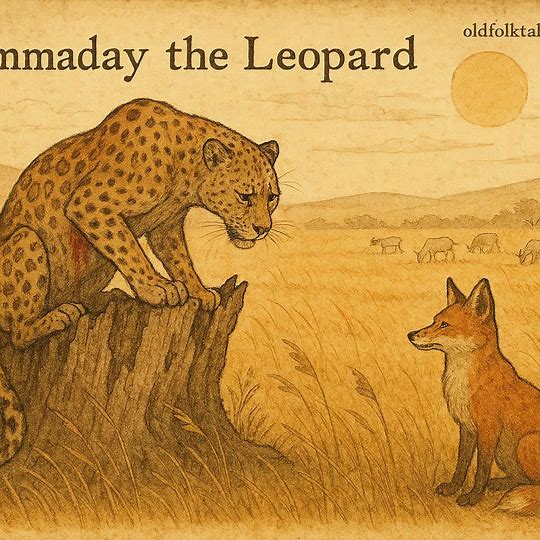Hemmaday, the young and ambitious leopard, stalked the golden savanna alongside his cunning companion, the fox. The sun had begun its slow descent, painting the tall grasses with a warm amber glow. Hemmaday’s eyes caught sight of a small herd of goats grazing peacefully, their bleating faint against the whispering wind. Yet a sudden pause gripped him; he hesitated, for he feared the sin of harming them. Turning to the fox, he asked, “Why do men tremble before sin, clever fox?”
The fox, with eyes sharp and glittering, replied, “It is for their posterity that they fear, young leopard. For what we do today echoes for generations yet unborn.”
Hemmaday pondered the words but soon brushed them aside. “My own offspring will find their path, separate from my deeds,” he said, his pride flaring. Without another thought, he sprang toward the nearest goat, muscles coiling with lethal precision.
But fate, as it often does, awaited him in the form of a jagged, hidden stump. Hemmaday’s powerful leap met the unforgiving wood, and a deep cut opened across his flank. Staggering back, he glared at the fox. “Did you not say that men fear sin for the sake of their children? Why, then, am I wounded and facing death?”
The fox, calm and unshaken, answered with a knowing glance, “Your father has eaten for you, Hemmaday. The price you now pay was laid before your birth, set by those who came before.”
READ THIS: The Tale of the Ape and the Gazel: A Tigréan Folktale from Eritrea That Teaches Respect for Nature
Pain coursed through the leopard, and he sank to the earth, the warm wind carrying his final breath across the sunlit grass. The fox stepped silently aside, mourning not with grief but with understanding of the cycle of cause and consequence.
From this tale, two proverbs arose among the Tigréan people: “The sin is for posterity, said the fox” and “Thy father has eaten for thee.” They became a guiding reminder that one’s actions are entwined with both ancestral legacy and future generations.
Moral Lesson
This folktale teaches that our choices carry consequences beyond the immediate moment, often shaping the lives of descendants. Pride, disregard for wisdom, and impatience can bring about suffering that our forebears have long anticipated. Understanding and respecting the lessons of the past can safeguard one from unnecessary misfortune, ensuring that one’s legacy is one of care rather than calamity.
Knowledge Check
Who were the main characters in the tale?
Hemmaday the Leopard and the Fox.
Why did Hemmaday hesitate before attacking the goats?
He feared the sin and its consequences for posterity.
What lesson did the fox convey to Hemmaday?
That people fear sin for the sake of future generations.
What caused Hemmaday’s death?
He was wounded by a hidden stump while pursuing the goats.
What do the proverbs “The sin is for posterity” and “Thy father has eaten for thee” signify?
They highlight the impact of ancestral actions and the long-term consequences of one’s deeds.
What is the cultural origin of this folktale?
Tigréan people of Eritrea.
Source: Tigréan folktale, Eritrea

